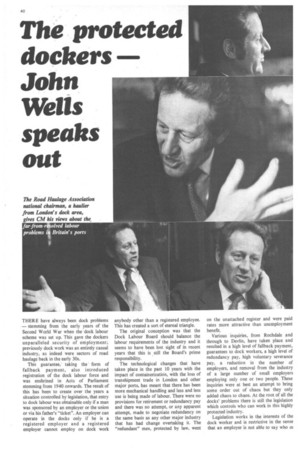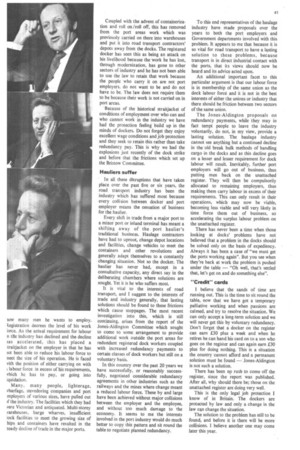The protected dockers John Wells speaks out
Page 36

Page 37

If you've noticed an error in this article please click here to report it so we can fix it.
THERE have always been dock problems — stemming from the early years of the Second World War when the dock labour scheme was set up. This gave the dockers unparalleled security of employment; previously dock work was an entirely casual industry, as indeed were sectors of road haulage back in the early 30s.
This guarantee,taking the form of fallback payment, also introduced registration of the dock labour force and was enshrined in Acts of Parliament stemming from 1940 onwards. The result of this has been to create over the years a situation controlled by legislation, that entry to dock labour was obtainable only if a man was sponsored by an employer or the union or via his father's "ticket". An employer can operate in the docks only if he is a registered employer and a registered employer cannot employ on dock work
anybody other than a registered employee. This has created a sort of eternal triangle.
The original conception was that the Dock Labour Board should balance the labour requirements of the industry and it seems to have been lost sight of in recent years that this is _still the Board's prime responsibility.
The technological changes that have taken place in the past 10 years with the impact of containerization, with the loss of transhipment trade in London and other major ports, has meant that there has been more mechanical handling and less and less use is being made of labour. There were no provisions for retirement or redundancy pay and there was no attempt, or any apparent attempt, made to negotiate redundancy on the same basis as any other major industry that has had change overtaking it. The "redundant" men, protected by law, went on the unattached register and were paid rates more attractive than unemployment benefit.
Various inquiries, from Rochdale and through to Devlin, have taken place and resulted in a high level of fallback payment, guarantees to dock workers, a high level of redundancy pay, high voluntary severance pay, a reduction in the number of employers, and removal from the industry of a large number of small employers employing only one or two people. These inquiries were at best an attempt to bring some order out of chaos but they only added chaos to chaos. At the root of all the docks' problems there is still the legislation which controls who can work in this highly protected industry.
Legislation works in the interests of the dock worker and is restrictive in the sense that an employer is not able to say who oi
low many men he wants to employ. kegistration decrees the level of his work 'orce. As the actual requirement for labour n tile industry has declined and the decline las accelerated, this has placed a Iraitjacket on the employer in that he has lot been able to reduce his labour force to fleet the size of his operation. He is faced vith the position of either carrying on with labour force in excess of his requirements, vhich he has to pay, or going into iquidation.
Many, many people, lighterage, vharfage, stevedoring companies and port :mployers of various sizes, have pulled out )f the industry. The facilities which they had vere Victorian and antiquated. Multi-storey varehouses, barge wharves, insufficient lock facilities to meet the growing size of hips and containers have resulted in the teady decline of trade in the major ports. Coupled with the advent of containerization and roll on /roll off, this has removed from the port areas work which was previously carried on there into warehouses and put it into road transport contractors' depots away from the docks. The registered docker has seen this as being an attack on his livelihood because the work he has lost, through modernization, has gone to other sectors of industry and he has not been able to use the law to retain that work because the people who carry it on are not port employers, do not want to be and do not have to be. The law does not require them to be because their work is not carried on in port areas.
Because of the historical straitjacket of conditions of employment over who can and who cannot work in the industry we have had the protection feeling build up in the minds of dockers. Do not forget they enjoy excellent wage conditions and job protection and they seek to retain this rather than take redundancy pay. This is why we had the explosions just recently of the dock strike and before that the frictions which set up the Bristow Committee.
Hauliers suffer In all these disruptions that have taken place over the past five or six years, the road transport industry has been the industry which has suffered most because every collision between docker and port employer means the cessation of business for the haulier.
Every shift in trade from a major port to a minor port or inland terminal has meant a shifting away of the port haulier's traditional business. Haulage contractors have had to uproot, change depot locations and facilities, change vehicles to meet the containers and other revolutions and generally adapt themselves to a constantly changing situation. Not so the docker. The haulier has never had, except in a consultative capacity, any direct say in the deliberating chambers where solutions are sought. Yet it is he who suffers most.
It is vital to the interests of road transport, and I suggest to the interests of trade and industry generally, that lasting solutions should be found to these frictions which cause stoppages. The most recent investigation into this, which is still continuing, arises from the report of the JoneS-Aldington Committee which sought to come to some arrangement to provide additional work outside the port areas for redundant registered dock workers coupled with increased redundancy payments to certain classes of dock workers but still on a voluntary basis.
In this country over the past 20 years we have successfully, or reasonably successfully, negotiated considerable redundancy agreements in other industries such as the railways and the mines where change meant a reduced labour force. These by and large have been achieved without major collisions between the employer and the employee, and without too much damage to lhe economy. It seems to me the interests involved in the port industry Would do much better to copy this pattern and sit round the table to negotiate planned redundancy. To this end representatives of the haulage industry have made proposals over the years to both the port employers and Government departments involved with this problem. It appears to me that because it is so vital for road transport to have a lasting solution to these problems, because transport is in direct industrial contact with the ports, that its views should now be heard and its advice acted upon.
An additional important facet to this particular argument is that our labour force is in membership of the same union as the dock labour force and it is not in the best interests of either the unions or industry that there should be friction between two sectors of the same union.
The Jones-Aldington proposals on redundancy payments, while they may in fact tempt people to leave the industry voluntarily, do not, in my view, provide a lasting solution. The haulage industry cannot see anything but a continued decline in the -old break bulk methods of handling cargo in the docks and as this decline goes on a lesser and lesser requirement for dock labour will result. Inevitably, further port employers will go out of business, thus putting men back on the unattached register. They will then be compulsorily allocated to remaining employers, thus making them carry labour in excess of their requirements. This can only result in their operations, which may now be viable, becoming less viable and will very likely in time force them out of business, so accelerating the surplus labour problem on the unattached register.
There has never been a time when those looking at docks' problems have not believed that a problem in the docks should be solved only on the basis of expediency. Always it has been a case of "we must get the ports working again". But you see when they're back at work the problem is pushed under the table — "Oh well, that's settled that, let's get on and do something else".
"Credit" cards I believe that the sands of time are running out. This is the time to sit round the table, now that we have got a temporary palliative working and when passions are calmed, and try to resolve the situation. We can only accept a long-term solution and we will never get this by voluntary redundancy. Don't forget that a docker on the register can earn /30 plus a week and when he retires he can hand his card on to a son who goes on the register and can again earn £30 plus for doing nothing. This is a situation the country cannot afford and a permanent solution must be found -Jones-Aldington is not such a solution.
There has been no rush to come off the register, since the report was published. After all, why should there be; those on the unattached register are doing very well.
This is the only legal job protection I know of in Britain. The dockers are protected by law and only a change in the law can change the situation.
The solution to the problem has still to be found, and before it is there will be more collisions. I believe another one may come later this year.












































































































